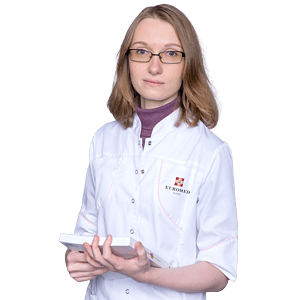Phlebology
What is this area of medicine concerned with?
Phlebology is a branch of medicine that deals with the anatomy of veins and venous outflow. A phlebologist treats veins (vessels that help blood to flow to heart) and venous valves, which serve to ensure that the blood moves only in one definite direction.
If the venous valves fail, the outflow of blood gets slower and it flows down, which leads to varicose veins – loss of elasticity and stretching of vein walls. Since a person is a bipedal creature, many people experience problems with veins, especially women over 40 and those people who work while standing.
Our doctors
Department's services
Why do patients choose phlebologists of Euromed Clinic?
Our phlebologists are high-end professionals in the field of vascular surgery and nonsurgical therapy. They have extensive experience and the most modern diagnostics methods. Our phlebologists will select the optimal, effective treatment for you and carefully weigh the pros and the cons of any chosen method.
What diseases does a phlebologist treat?
- Phlebeurysm;
- Deep venous thrombosis in extremities;
- Thrombophlebitis
- and other vascular problems and venous drainage disorders.
When should I visit a phlebologist?
- At “spider veins” or dilated vessels on the legs;
- At heaviness in the legs;
- At edema;
- At itching or burning in legs;
- In case of pigment spots;
- At ache “deep inside” a muscle.
Besides, even though you have no symptoms, you should visit the phlebologist:
- If you plan a pregnancy;
- If there is varicosity or thrombosis in your family’s case history;
- Women over 45-50 also have to visit the phlebologist for precaution.
Diagnostic methods of a phlebologist:
Duplex scanning of veins is the main visualization method used by our phlebologists. Special linear sensors send and receive a sound wave in the range of 5-10 MHz.
It is possible to “see” a vessel, its walls, intravasal growths, measure its diameter and determine the function of its valves in any place. The non-invasiveness allows the phlebologist to continue the scanning indefinitely in time, perform it in different positions of the subject and repeat any number of times.
Treatment methods of a phlebologist
- Compression sclerotherapy of varicose veins using modern phlebosclerosing drugs and technologies;
- Medical compression;
- Pharmacological therapy;
- Physical methods of treatment (a specialist prescribes them to activate vascular motility, fight edema, for local anesthesia, relieve inflammation)
- Minimally invasive and surgical methods of treatment.
What happens during a phlebologist’s appointment
A phlebologist examines the patient, interviews him, performs investigations (ultrasound, duplex or triplex scanning of veins), reviews previous medical history. Then the doctor develops a treatment schedule with regard to the data obtained and the patient’s body individual peculiarities.
FAQ
What factors increase the probability of varicose veins?
Women often suffer from this disease because of the following risk factors:
- High heels;
- Pregnancy;
- Difficult delivery;
- Wearing a compression belt, bandage or corset.
Other risk factors:
- “Standing” work (work at the conveyor, as a salesperson)
- Genetic predisposition;
- Physical training or work that involves weight lifting;
- Obesity;
- Sedentary lifestyle;
- Venous circulation disorders due to different conditions of internal organs.
What type of diet is recommended when you have varicose veins?
First of all, you should control the amount of fluid you drink to reduce edema. If you are overweight, it is recommended to give up sugar and white flour products. The following products are beneficial:
- Sour apples, garlic, fresh fruit and vegetables;
- Water porridge, wholemeal bread;
- Fresh juice and herbal tea;
- Beef liver, fish and seafood instead of fatty and smoked meat;
- Dried fruit and honey instead of sweets.
How to book an appointment?
- Online appointment is the fastest and most convenient way. It is available 24 hours a day, 7 days a week. It takes less than 5 minutes to schedule!
- You can also call us at + 7 812 327 03 01 (24/7), and the call-centre specialists will schedule an appointment whenever convenient to you.
My stay in the Euromed … is a good memory.We have been nicely welcome at the reception the day of my arriv...
I am writing to thank all of you for your excellent treatment during my stay in the cl...



